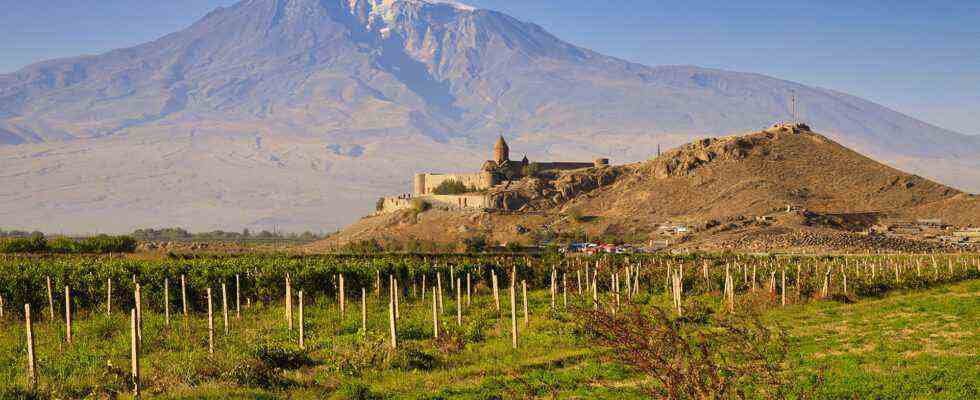Status: 01/14/2022 02:01 a.m
It would be a historic step – if the negotiations beginning today are successful: Armenia and Turkey want to normalize their relations. An agreement could spread throughout the Caucasus – and beyond.
Football diplomacy – that’s what the first attempt to normalize relations between Armenia and Turkey was called more than a decade ago. Hope came in 2009 when then-Armenian President Serzh Sargsyan and his Turkish counterpart Abdullah Gül shook hands during a match between the two national teams.
It was a gesture of rapprochement between two countries that have not had diplomatic relations since 1993, whose borders are closed and who are divided over the recognition of the Armenian Genocide.
But the negotiations failed. The situation in the region eventually escalated to the point of war in autumn 2020. Armenia suffered a heavy defeat against hostile neighbor Azerbaijan, which was supported by ally Turkey.
The focus: opening up the transport routes in the region
A year later, fear and anger at Azerbaijan and Turkey are still high in Armenia. Nevertheless, the government around Prime Minister Nikol Pashinyan wants to make another attempt to normalize relations and open the border with Turkey. Both states appointed special envoys who are now meeting in Moscow for talks.
The peace agreement with Azerbaijan already contains a point about the reopening of transport routes in the entire region. Armenia, as the most isolated country, could also benefit from the opening of borders and transport routes in the direction of partners Iran and Russia.
A format initiated by Turkey includes not only the three South Caucasus states of Armenia, Azerbaijan and Georgia, but also the other two regional powers, Russia and Iran, which also want to promote infrastructure development in the region.
Recognition of genocide not an issue
The government in Yerevan has already lifted a post-war embargo on Turkish products that had particularly affected the Armenian population. It has suffered from high prices for everyday products for decades. The war and the corona pandemic exacerbated the situation. In 2021, food prices alone rose by almost 20 percent.
The government wants to enter into negotiations with Turkey “without any preconditions”. The recognition of the genocide should not be an issue. This question will be postponed and delegated to the reconciliation process after normalization, explains political expert Richard Giragosian, director of the Regional Studies Center in Yerevan. The normalization represents a first step – “the basic minimum for neighbors”. A reconciliation is a “much more intensive, comprehensive and longer process that extends over generations”.
Far-reaching plans of Turkey
For Turkey, weakened by an economic crisis, the advantages are also obvious. Not only could the east of the country benefit from the opening of the border. President Recep Tayyip Erdogan is also relying on the export of Turkish goods to combat massive inflation. And he wants to position Turkey as the leader of the Turkic-speaking states. Turkey and Azerbaijan see each other as close economic and military partners anyway.
Then, in mid-November, Turkey, along with Azerbaijan, Kazakhstan, Kyrgyzstan and Uzbekistan, upgraded the existing “Council of Turkic States” to the “Organization of Turkic States”. Turkmenistan and Hungary are present as observers.
In addition, Turkey and Azerbaijan established a partnership with Pakistan last year. In September, the first joint military exercise “Three Brothers” took place in Azerbaijan. In Afghanistan, Turkey is also negotiating to take over the logistics and security of the airports, as it did until the departure of foreign forces in the summer of 2021.
Conflict over southern Armenia
However, a tricky point in the chain of land connections is the direct route from Turkey to Azerbaijan: Turkey borders on the Azerbaijani exclave of Nakhichevan. This is separated from the heartland of Azerbaijan by Armenian territory.
The conflict in southern Armenia ignited over who should have authority over a road to be built and the railway line. Behind this is Armenia’s fear that its territory could be severed and the connection to Iran cut off. These fears are spurred on by aggressive rhetoric by the Azerbaijani leadership and military infighting encroaching on Armenian territory. According to Giragosian, however, there is now a preliminary agreement, according to which Armenia retains sovereignty and Russia takes over surveillance.
With a win-win situation in mind for all, it seems possible that rivals Turkey, Russia and Iran will compromise and put pressure on enemies Armenia and Azerbaijan. It is unclear how the affected people will deal with it without an accompanying reconciliation process – whether the prospect of an economic improvement in the situation will drown out nationalistic and revanchist moods.

